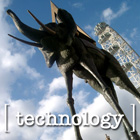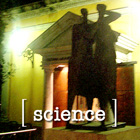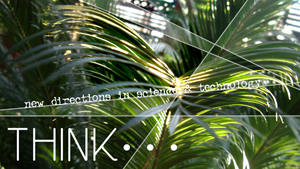
"If we knew what it was we were doing, it would not be called research, would it?"
|
IN PART, USER PRIVACY WILL HAVE TO BECOME PARAMOUNT TO ALL OTHER TECHNICAL CONSIDERATIONS 24 January 2008 The potential for broad-scope "electronic agents" —preprogrammed service aggregators and self-organizing databases with proactive marketing capability—, aiding in everyday information-related activities, will require a new security standard to prevent identity theft, which could become one of the gravest threats to economic performance and individual liberty. [Full Story] PINK SOLAR CELLS CAN PRODUCE POWER AT 25% OF CURRENT COST As environmental groups, lobbyists and the general public push for more environmentally friendly industrial practices, scientists are finding innovative ways to bring down costs and increase the efficiency of renewable resources. The dye-sensitive solar cells (DSSC), with a pinkish sheen, now being developed at Ohio State University, are an example of the type of engineering innovation that could bring about a genuine green-power revolution. [Full Story] THINK: A NEW RESEARCH PROJECT EVOLVING SOLUTIONS FOR SMARTER LIVING Through the 'Think' project, Casavaria [Sentido's publisher] aims to develop major new technologies to help bring the costly aspects of everyday post-industrial life in line with what the planet, and civilization itself, can sustain. The project seeks to reduce instability in technology for communication and to develop an entirely new sort of renewable "fuel" source. [Full Story] GOOGLE LAUNCHES SPECIAL HEALTH ADVISORY GROUP, TO HELP USERS TARGET NEEDED HEALTH INFORMATION Google has launched a new special advisory group for health issues. The aim is to improve its overall search technology so that the end-user's experience is not a confusion of mis-matched or possibly dangerous flawed information regarding health issues. The hope is that Google's ability to provide relevent content will be honed and new search refining techniques will be discovered through the effort to ensure that health-related information is more relevant, more reliable, and more easily accessible. [Full Story] GEOTHERMAL: WEST DIGS DEEP FOR THE NEXT BIG THING IN POWER Geothermal energy is increasingly being touted by scientists and researchers as one of the most efficient and environmentally friendly sources of power available. Currently, geothermal sources supply enough energy, 2,800 megawatts, to run 2.8 million American homes. [Full Story] NUCLEAR SCIENTISTS HAVE MOVED DOOMSDAY CLOCK FORWARD, WARNING OF 'NEW NUCLEAR AGE' The Bulletin of Atomic Scientists has moved the minute hand on the figurative 'Doomsday Clock' forward 2 minutes, from 7 minutes to Midnight to 5 minutes to midnight. The figurative clock measures the possibility of major threats to civilization bringing about the end of continuity in human society, and was initiated due to the threat from nuclear weapons. [Full Story] BIOMETRIC DEVICES MAY UNDERMINE INDIVIDUAL LIBERTY In the wake of major terrorist attacks against densely populated civilian centers in several countries across Europe, Asia and America, governments and private industry are looking at ways of using biometric scanning technology to determine who should or should not have access to certain locations and services. The technology is complicated and highly advanced, but unproven, and potentially highly flawed. [Full Story] NEW MICROWAVE ENGINE APPLIES THEORY OF RELATIVITY A new breakthrough in propulsion technology may enable a fuel-free engine with no moving parts to use microwaves to push satellites through space and automobiles on earth. The science is complicated and controversial, but appears to be sound and takes advantage of Einstein's landmark theory of relativity to turn contained microwaves into a propulsion system, in the form of a non-mechanical engine. [Full Story] QUANTUM STABILITY FROM GRAPHENE'S 'PERFECT' CRYSTAL FILM Philip Ball reports in the New Scientist that discoveries in the quantum properties of graphene, a single-atom-thick sheets of interlinked carbon atoms may hold the secret to superfast computing, beyond the physical capacity of silicon. The unique material is obtained by flaking or peeling individual sheets away from graphite. [Full Story] GATES ANNOUNCES PLANS TO REPLACE PAPER WITH SILICON Bill Gates is busy dreaming of new inroads (into your everyday life) for his company as computer technology becomes faster, cheaper, more ubiquitous. He told a London audience that the static format of paper would be replaced by paper-thin digital wireless devices, always online, within 10 years. [Full Story] IS YOUR CEREAL BROADCASTING YOUR SECRETS? How much do you know about your cereal, and how much does it know about you? What about your money, your passport, your boarding pass? These are just some of the items in your personal sphere which may soon be broadcasting radio frequencies, testifying to your habits and your movement. RFID, or Radio Frequency IDentification technology, is the reason why. Various private firms are currently researching, designing, producing and selling RFID chips similar to a grain of rice in size and shape, which can be implanted in human beings in order to verify their identity. This is not a far-fetched paranoiac vision of the future; it is actually happening, and the powers that be are excited about it. [Full Story] POPULAR OUTCRY VIA INTERNET, IN CHINA A case of alleged homicide by vehicle in rural China has led to a new wave of public usage of the Internet. The popular website Sina.com found itself at the center of public debate about the case, in which a woman driving a BMW killed a peasant woman who worked from a cart, running her over. Some 200,000 Chinese citizens voiced their outrage in chatrooms at Sina.com, after the driver was given a suspended sentence and allowed to go free. Allegations of corruption surround the trial, and due to public sentiment, the government has said it will launch an investigation into possible judicial corruption. Mrs. Su, the driver, may be handed a stricter sentence, in order to appease public sentiment, and diffuse increasing tensions over class division. Her husband has reportedly admitted paying $20,000 to witnesses to obtain their silence. According to the organization Reporters without Borders (RSF), China maintains harsh restrictions on what type of information can be shared online, and has even specifically banned the dissemination of information about AIDS. In November 2002, a new law was imposed that places a criminal burden on owners of Internet cafés for customers' viewing of banned sites. RSF adds that "Nearly 3,000 people were recruited to defend the government from Internet subversion." In December, jailed webmaster Huang Qi was placed in solitary confinement, after RSF tried to visit him in a maximum security Chinese prison. Though China still jails "Internet dissidents" who speak against the government's policies, and sites are often censored or shut down, the spread of Internet cafés has contributed to the spread of public debate and open criticism of the Communist party. The case of Mrs. Su has become known as the "BMW case", due to the class difference between victim and accused. The controversy has fuelled the rapid expansion of Internet usage among rural and poor Chinese citizens, who aspire to making their voices heard via the uncontainable Internet. [For more: NYT] |
||||||||||||||
|
|||||||||||||||



